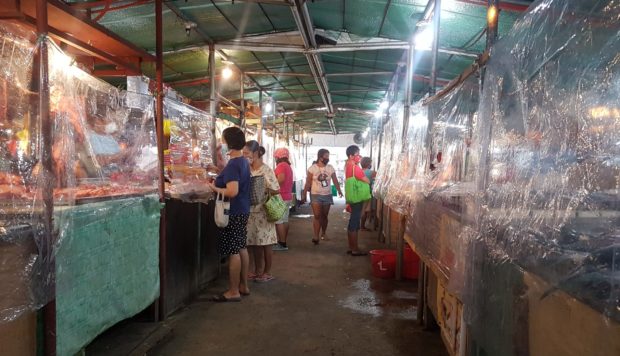Cash aid for poor: P8,000 in Metro; P5,000 in regions

BUSINESS UNUSUAL Plastic sheets provide a safety barrier between vendors and customers at a public market in Los Baños, Laguna, as a measure to prevent the spread of the coronavirus. Three weeks into the Luzon quarantine, the movement of goods across the provinces remains problematic as local governments set up their own checkpoints and impose rules inconsistent with national guidelines. —KIMMY BARAOIDAN
MANILA, Philippines — Though they are all poor families, they are not equal under the government’s emergency assistance package.
Poor families in Metro Manila are each entitled to the maximum P8,000 in monthly cash subsidy for two months, while those in seven less prosperous regions, including Bicol, Caraga and Bangsamoro, will have to settle for P5,000, according to the chair of the House ways and means committee.
Albay Rep. Joey Salceda on Monday gave a breakdown of the amounts to be handed out to some 18 million indigent families affected by the coronavirus crisis under the P200-billion cash assistance provided by the Bayanihan to Heal as One Act.
Salceda said the cash subsidy schedule was based on the upper limit of the daily minimum wage in each region.
Many families, especially daily wage earners, are struggling to feed themselves as most work has stopped and people are required to stay at home as part of the Luzon quarantine, now in its third week.
So when is the cash aid actually coming?
A week since Congress approved special powers for President Duterte to respond to the new coronavirus pandemic, Malacañang reported to the legislature that it was finalizing the database and guidelines for the country’s social amelioration programs, including the monthly subsidy for low-income families.
In its report submitted early Tuesday, Malacañang said the Department of Finance would provide technical assistance to the Department of Social Welfare and Development (DSWD) in forming a consolidated database to host COVID-19 social amelioration programs.
It said guidelines for the emergency subsidy program implementation would be rolled out on April 1.
As for the special risk allowance for public health workers, the Palace said the Department of Budget and Management (DBM) was drafting the executive order for the amount to be given on top of their hazard pay.
In the meantime, the Palace said 8,641 beneficiaries had received P5,000 in financial assistance from the COVID-19 Adjustment Measures Program of the Department of Labor and Employment (Dole). The program has initially set aside P1.3 billion to support workers whose employers in the private sector have implemented flexible work arrangements or have temporarily closed due to COVID-19.
Labor Secretary Silvestre Bello III appealed to employers on Tuesday to submit their payrolls so the government could release the cash assistance. Once the employers gave the documents, the Dole would directly deposit the cash grant to the workers’ payroll accounts in two days.
Otherwise, the workers themselves may submit their payrolls in batches and the Dole would send in the money through remittance centers.
As of March 27, the Dole said the number of affected workers from more than 9,000 establishments had swelled to 317,171. This prompted the labor department to ask the DBM for an additional P5 billion to support workers in both formal and informal sectors.
Informal sector, OFWs
Initial reports received by the Dole showed that 117,890 workers in the informal sector had been affected by the lockdown. They are to be supported under the Tulong Panghanapbuhay sa Ating Disadvantaged/Displaced Workers program, which would pay them the minimum wage for 10 days of work, such as disinfecting their homes and communities.
As for displaced overseas Filipino workers (OFWs), Bello said P1.5 billion had been allocated for about 70,000 of them. Each is entitled to receive cash assistance of $200.
The DSWD said it was distributing food and nonfood aid, and had given out assistance worth P22.3 million. Its field offices have also delivered P26 million worth of food packs in Metro Manila and P4.5 million in Central Luzon.
DSWD spokesperson Irene Dumlao said the department was still “coordinating with local government units” to identify the families to be given aid. “We [are] starting with the profiling now using the social amelioration card,” she said.
Based on a table provided by Salceda, poor households in Metro Manila will get P8,000 each month, as the daily minimum wage in the metropolis is P537.
Next biggest amount
The next biggest amount of P6,500 will be given to families in Central Luzon, with a daily minimum wage of P420, and Calabarzon or Region 4A (P400).
Oddly, in Central Visayas, where the daily minimum wage is P404, poor families will be entitled to only P6,000, lower by P500 than their counterparts in Calabarzon, which has a lower daily minimum wage.
Other regions where each poor household will receive P6,000 are Western Visayas (P395), Northern Mindanao (P365) and Davao (396).
Entitled to P5,500 are poor families in the Cordillera Administrative Region (P350), Ilocos (P340) and Cagayan Valley (P370).
The smallest cash subsidy of P5,000 goes to poor households in Mimaropa or Region 4B (P320), Bicol (P310), Eastern Visayas (P315), Zamboanga (P316), Soccsksargen (P326), Caraga (P320) and the Bangsamoro Autonomous Region in Muslim Mindanao (P325).
Senate Minority Leader Franklin Drilon said on Tuesday the government might not be able to bankroll the multibillion-peso cash subsidies because the closure of many businesses and the slowdown in economic activities would result in a significant drop in revenue collection.
—WITH REPORTS FROM PATRICIA DENISE M. CHIU AND MARLON RAMOS INQ
RELATED VIDEO

For more news about the novel coronavirus click here.
What you need to know about Coronavirus.
For more information on COVID-19, call the DOH Hotline: (02) 86517800 local 1149/1150.
The Inquirer Foundation supports our healthcare frontliners and is still accepting cash donations to be deposited at Banco de Oro (BDO) current account #007960018860 or donate through PayMaya using this link.